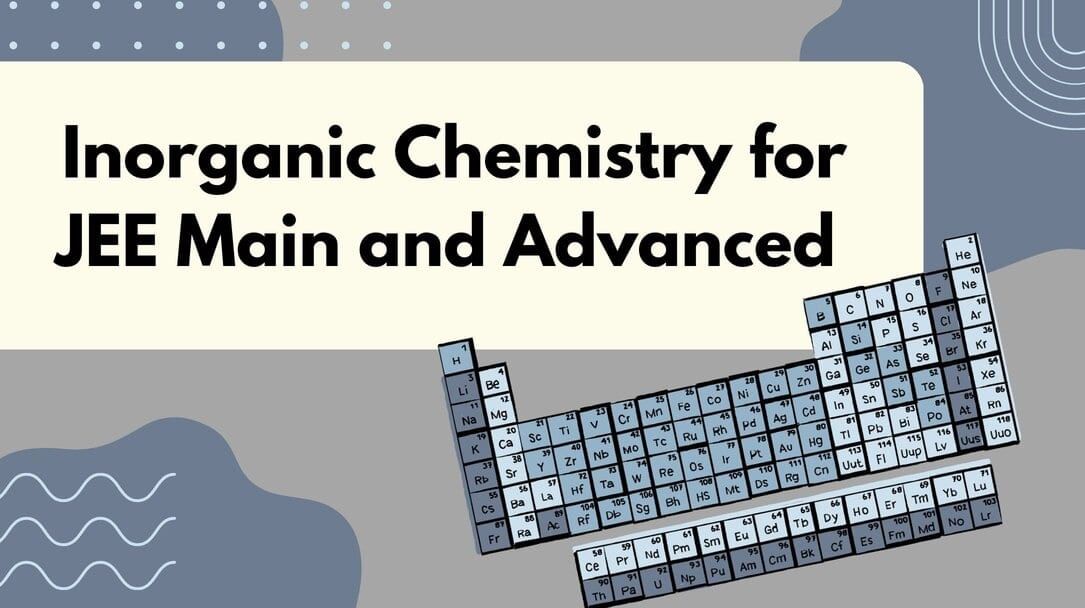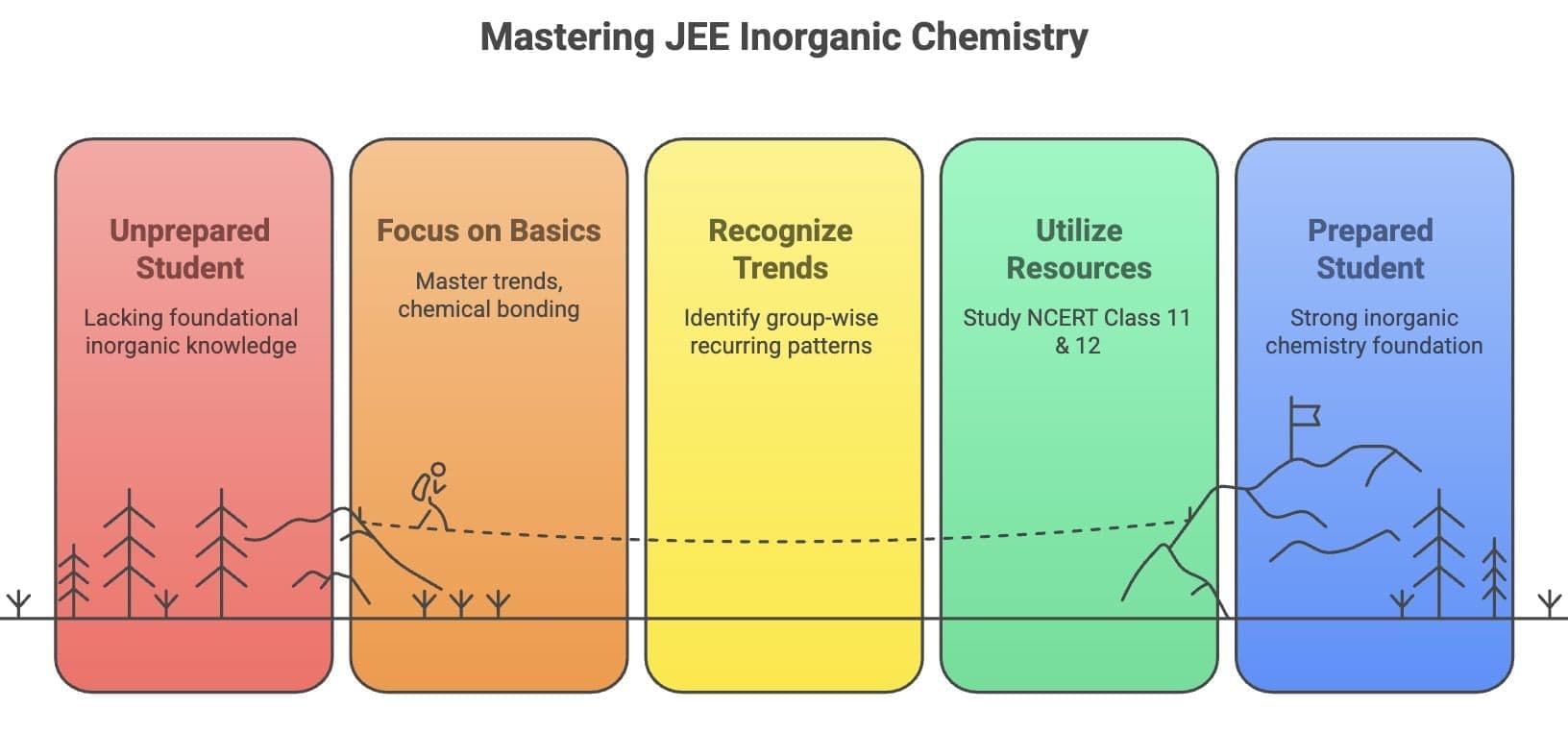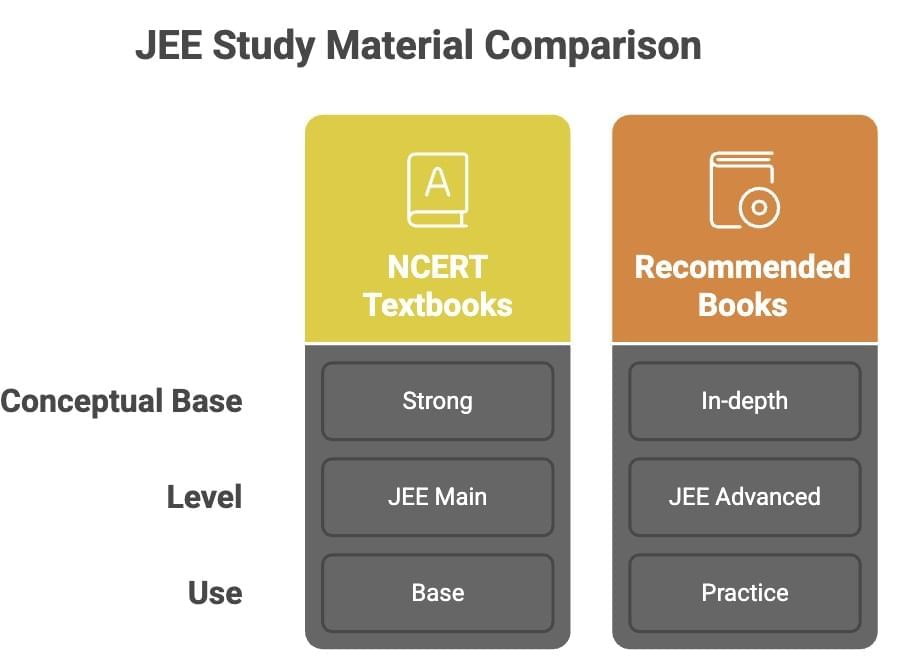How to Study Inorganic Chemistry for JEE | Chemistry for JEE Main & Advanced PDF Download
Inorganic Chemistry is an essential part of the JEE syllabus. It focuses on understanding concepts, remembering facts, and using periodic trends to solve questions. This guide offers practical strategies to help you study Inorganic Chemistry effectively, keeping the JEE syllabus in mind. 
Understanding the JEE Inorganic Chemistry Syllabus
The JEE Inorganic Chemistry syllabus covers topics for both JEE Main and JEE Advanced. Below is a concise overview based on the standard syllabus:
- Classification of Elements and Periodicity: Periodic table, trends in atomic and ionic radii, ionization energy, electron affinity, electronegativity, and oxidation states.
- Chemical Bonding: Ionic, covalent, coordinate bonds, VSEPR theory, hybridization, molecular orbital theory, and hydrogen bonding.
- Coordination Compounds: Nomenclature, isomerism, valence bond theory, crystal field theory, and stability of complexes.
- s-Block Elements: Alkali and alkaline earth metals, their compounds, and anomalous behavior.
- p-Block Elements: Groups 13–18, properties, compounds (e.g., boranes, oxides, halides), and allotropes.
- d- and f-Block Elements: Transition metals, lanthanides, actinides, properties, and applications.
- Hydrogen and Its Compounds: Hydrides, water, hydrogen peroxide.
- Environmental Chemistry: Atmospheric pollution, water pollution, and soil pollution.
Here are some effective strategies to boost your preparation and performance!
Build a Strong Foundation
- Focus Areas: Start with periodic table trends and chemical bonding, as they underpin topics like coordination compounds and p-block elements.
- Understand Patterns: Study group-wise trends (e.g., Group 15 or 16 compounds) to minimize memorization and recognize patterns.
- Resources: Use NCERT Class 11 and 12 textbooks, as JEE Inorganic Chemistry heavily relies on NCERT content.

Master Memorization with Understanding
- Key Facts: Learn exceptions, anomalous behaviors (e.g., lithium in s-block), and specific properties (e.g., colors of transition metal ions).
- Group-Wise Study: Organize p-block elements by group (e.g., Group 13: boron family) to understand trends in reactivity and compounds.
- Named Compounds: Memorize preparation, properties, and uses of key compounds like KMnO₄, K₂Cr₂O₇, and borax.
Create a Structured Study Plan
- Syllabus Division: Break the syllabus into manageable sections with time allocation based on weightage:
- High Weightage (20–25%): p-Block elements.
- Moderate Weightage (15–20%): Coordination compounds, d/f-block elements, chemical bonding, periodic table.
- Low Weightage (10–15%): s-Block elements, metallurgy, environmental chemistry.
- Daily Routine: Dedicate 1–2 hours daily to Inorganic Chemistry. Revise one topic, solve 15–20 questions, and note key points.
- Weekly Revision: Review summaries and exceptions weekly to reinforce retention.
- Study Plan for JEE: Access the expert-designed JEE study plan by EduRev, tailored to help you cover every topic efficiently and stay ahead in your preparation.
Utilize Quality Study Materials
- NCERT Textbooks: Use Class 11 and 12 NCERT books for a strong conceptual base, as JEE often tests NCERT-based questions.
- Recommended Books:
- Concise Inorganic Chemistry by J.D. Lee (adapted version): For in-depth understanding.
- Problems in Inorganic Chemistry by V.K. Jaiswal: For JEE Advanced-level practice.
- Inorganic Chemistry by O.P. Tandon: For additional practice.

Prioritize Practice and Analysis
- DPPs: Incorporating daily practice papers into your preparation is a powerful strategy to build confidence, enhance problem-solving skills, and solidify conceptual understanding.
- Previous Years’ Papers: Analyze JEE Main and Advanced papers from the last 10 years to identify patterns. Expect 6–8 questions in JEE Main and 5–7 in JEE Advanced from Inorganic Chemistry.
- Mock Tests: Take timed mock tests to enhance recall under pressure.
- Error Analysis: Maintain a notebook to categorize errors (factual, application, or oversight) and revisit them regularly.
Use Memorization Techniques
- Mnemonics and Charts: Create mnemonics for sequences like periodic table groups or compound colors (e.g., “Violet Copper Nickel” for Cu²⁺, Ni²⁺). Use wall charts for quick revision.
- Flashcards: Make flashcards for compounds, formulas, and properties (e.g., Na₂CO₃ uses, FeSO₄ color).
- Formula sheet: Prepare a one-page formula sheet for each chapter—include key formulas, units, and constants. Keep it on your desk or stick it near your study area for quick recall before practice or mock tests. This helps reinforce memory and reduces panic during revision.
- JEE Revision Notes: Make or access short, crisp revision notes for every chapter—especially reactions, concepts, and exceptions. Use EduRev’s ready-made revision notes to save time and boost last-minute preparation. They’re perfect for daily recaps and pre-test brushing.
- Tips and tricks for JEE: Learn shortcut techniques, elimination tricks, and time-saving methods for Physics calculations, tricky Chemistry questions, and Math problem-solving. EduRev’s curated tips help you avoid silly mistakes and improve accuracy under pressure.
Exam Day Tips

- Prioritize Easy Questions: Start with straightforward questions (e.g., periodic trends, s-block properties) to secure quick marks.
- Quick Recall: Avoid overthinking factual questions, as Inorganic Chemistry relies heavily on memory.
- Double-Check: Recheck answers for qualitative analysis or coordination compound questions to avoid errors.
Additional Tips
- Consistency: Study Inorganic Chemistry daily to retain facts and exceptions.
- Health and Well-being: Maintain 6–8 hours of sleep, regular exercise, and a balanced diet to stay focused.
- Motivation: Set short-term goals (e.g., mastering p-block Group 15 in a week) and reward yourself to stay motivated.
By adopting this structured approach—balancing conceptual understanding, effective memorization, and consistent practice—you can excel in Inorganic Chemistry for JEE Main and Advanced. Stay focused, practice diligently, and approach the exam with confidence to maximize your score.
|
361 videos|822 docs|301 tests
|
FAQs on How to Study Inorganic Chemistry for JEE - Chemistry for JEE Main & Advanced
| 1. What are the key topics included in the JEE Inorganic Chemistry syllabus? |  |
| 2. How can I effectively memorize the periodic table for JEE preparation? |  |
| 3. What strategies should I use to tackle coordination compounds in Inorganic Chemistry? |  |
| 4. How important is conceptual understanding in Inorganic Chemistry for JEE? |  |
| 5. What resources or books are recommended for studying Inorganic Chemistry for JEE? |  |





















